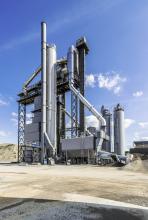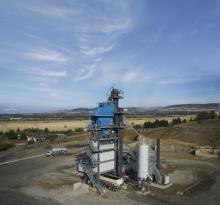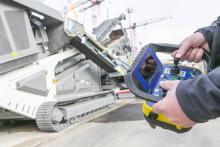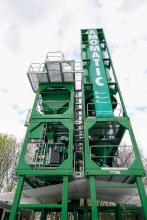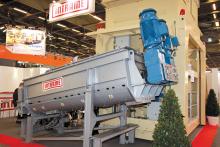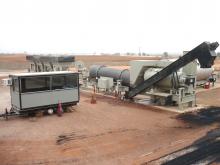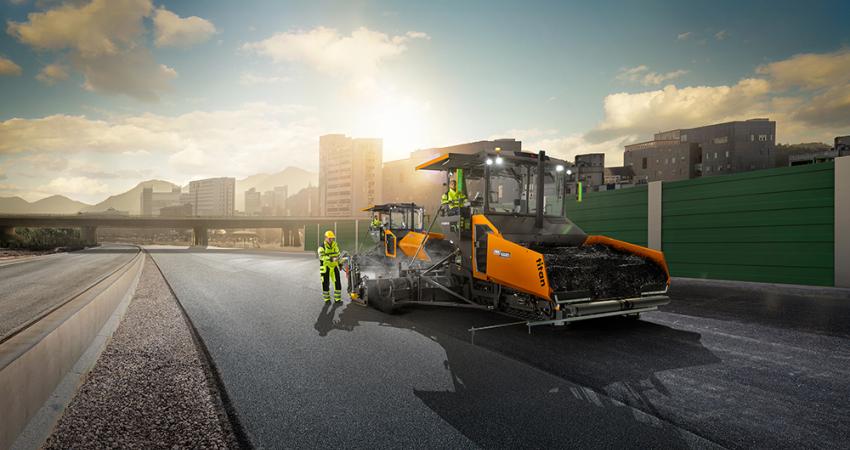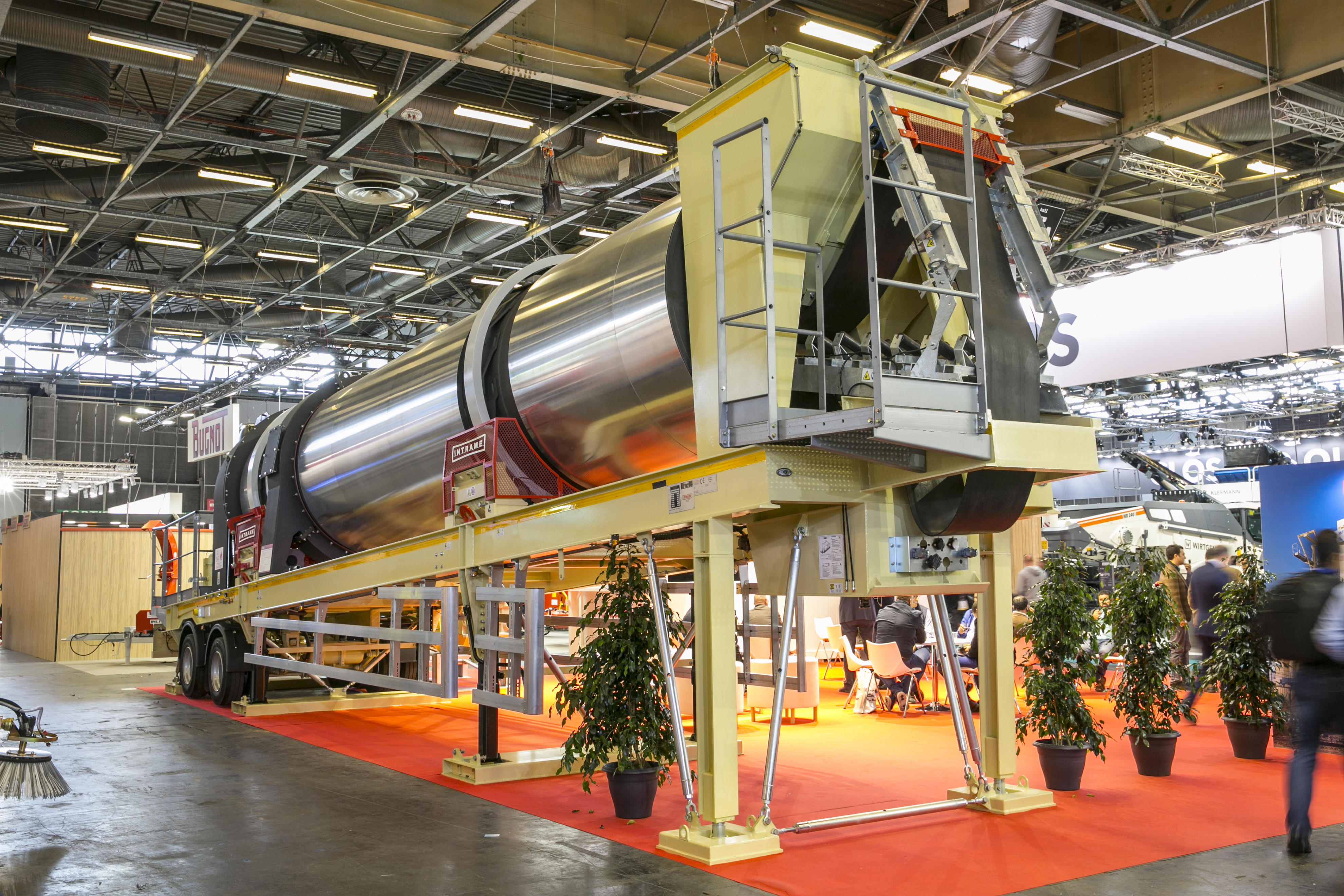
Asphalt plant technology continues to advance as the rival firms fine-tune their technologies for greater performance. New plants can give higher quality output due to new control technologies, while also allowing for recycled asphalt pavement (RAP) to be used more efficiently, while still ensuring tight mix specifications are met.
The EX Series asphalt plants produce 90-385tonnes/hour at a low cost/tonne. The plants also are capable of processing as much as 50% RAP. The EX Series uses counterflow technology with separate drying and mixing zones to achieve maximum heat transfer and fuel efficiency. The system virtually eliminates unsafe hydrocarbon emissions, a common problem with other drum mix plants. To make the plants even more environmentally friendly, ADM reduced emissions by designing the counterflow system to reintroduce residual gases back to the drum’s combustion zone.
The EX Series comes in portable and stationary models that meet US federal and state specifications and feature technology to ensure output meets necessary specifications. The sophisticated plant controls are said to be simple to use and the EX Series can be controlled by a single operator, with material feed supplied by a loader operator.
A wide range of components is offered so that customers can suit plants to their requirements. ADM also offers a range of extra units that can be added including cold feed bins, hot oil asphalt cement tanks, portable and stationary bag houses, mineral filler systems, RAP systems, self-erect and stationary silos, weigh and drag conveyors, weigh batchers and fuel oil tanks.
In all, the firm offers four models of portable and stationary recycle systems, which allow plants to use milled material in hot mix asphalt (HMA). This technology allows a producer to deliver a quality mix at a lower price.
The 13.5tonne capacity recycle bins are said to be durable due to reinforcing and have steeply sloped sidewalls to prevent plugging or bridging as well as tapered discharge openings. The recycle system transfers RAP from the bin with a heavy-duty weigh conveyor that introduces RAP to the dried aggregate mix after the heating process. As much as 50% of the HMA can contain recycled pavement, depending on the conditions and type of plant.
In addition, the firm now has its latest generation Astec Warm Mix System, which offers reduced energy consumption, lowered emissions, and the elimination of visible smoke for the producer. Astec says that its warm mix system achieves a lower temperature at a lower cost by eliminating the need for additives or special asphalt cement. This system injects a small quantity of water into the liquid AC to create microscopic steam bubbles, which then reduce the viscosity of the liquid AC and allow the mix to be worked at lower temperatures.
And the company aims to launch its novel Silobot inspection unit in due course. This will allow users to check the status and maintenance needs for silos safely. The compact unit is designed to operate inside a silo, allowing the plant owner to monitor condition remotely.
From
Designed for mobility, the plants fit inside standard shipping containers sizes, maximising mobility and versatility. The firm says that the ECO units can be operated as stationary plants, but can also handle fast location changes without problems. Because all main components are designed in standard container dimensions, they can be easily transported by road, sea or rail. The plants are also said to be cost-efficient and effective, while offering optimum mix quality. The firm says that the ECO plants feature maintenance-friendly, high-quality and durable components. Improved maintenance is achieved by large service openings, LED lighting, a simplified lubrication, good accessibility and the availability of an electric and compressed air connection for tools.
Benninghoven has relied on loading skip technology as the link between mixer and loading silo. When working like this, the skip volume corresponds to the volume of the mixer. In essence, the mixer drains the asphalt vertically downwards into the skip. The skip then positions itself vertically above the targeted loading silo pocket and again drains the stored mix vertically downwards. This is a proven technology for excluding segregations in the mix.
The new alternating chute unit is, because it is a purely mechanical structure, less likely to malfunction. There are no sensor systems, motors and brakes and there is also a fast and load-free positioning for silo selection.
Also, separation in the end-product is minimised through active cross-mixing in the material transfer. Separation effects in the end product are minimised due to cross-mixing in the material transfer, while the proven geometry of the Benninghoven loading mixed materials storage silos is said to ensure mass flow instead of core flow, further preventing segregation in the mix.
The patented TRX 100% technology, based on the drying of asphalt aggregates at low temperature, is said to reuse and preserve the binder in the asphalt. This is achieved through longer mix times, together with an innovative heating system. According to the firm, the TRX 100 is the most efficient mobile recycling solution on the market.
The plant has been developed between Marini Ermont and Eurovia’s Technical and Research Division. The project forms part of
Spanish asphalt plant manufacturer
“Today, everything is about RAP,” said Intrame CEO Antonio Morón Hodge. “Customers are interested in the ability to add more RAP, to use lower temperatures and to mix with bitumen foaming emulsion.”
The plants have longer drying drums to allow a higher proportion of RAP, up to 50%, to be introduced into the mix. And, as with all Intrame’s continuous plants, the Flow-Mix range has a separate mixer – rather than relying on mixing everything in the drum – because this leads to a more homogenous mix and hence a better quality of pavement, says Hodge.
Intrame’s 140tonne/hour Flow-Mix 140 continuous plant can be used together with its recently-developed Asflow 20 control system. This contaol system can be used for the firm’s continuous and batching plants. The firm has sold two such plants to date, one to a customer in Burkina Faso, the other to Mauritania. Intrame is currently targeting markets in Africa and South America, says Hodge: “We have increased our presence in South America with a new network of dealers. And with recent deals in South Africa and Australia, we are increasing our presence globally.”

